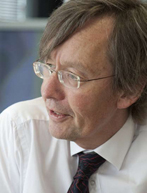Interview with Professor Phil Quirke, Leeds ECMC
 As one of the Leeds ECMC team’s most established figure-heads, Professor Phil Quirke runs an active research group in bowel cancer as well as being the Academic Training Programme Director for West Yorkshire and the Chair of the NHS Bowel Cancer Screening Programme Pathology Committee.
As one of the Leeds ECMC team’s most established figure-heads, Professor Phil Quirke runs an active research group in bowel cancer as well as being the Academic Training Programme Director for West Yorkshire and the Chair of the NHS Bowel Cancer Screening Programme Pathology Committee.
His major interests are in bowel cancer, where he works to improve the outcome for patients with cancer. He attributes the ‘ability to change outcomes and reduce the side effects we create when we treat people’ as one of the reasons he was attracted to this career.
Currently, Professor Quirke leads a highly diverse team of medics, scientists, and technicians, who are successfully ‘collaborating together to improve and guide therapy’. Working with almost 40 national and international trials funded by a wide range of sponsors, he praises the landscape of experimental cancer in the UK for its ‘very strong multidisciplinary nature, the excellent structures for clinical trials, and the infrastructure and support of the NHS and Universities’.
Looking towards the immediate future of experimental medicine, Professor Quirke believe that the key for continued success lies in ‘delivering what we already know works effectively and then identifying new ways to prevent and screen for cancer’.
Hugely committed to making a difference in his chosen area of study, Professor Quirke is a highly driven researcher. He notes Professors W. Thurlbeck, C.C. Bird, M. Dixon, and N.A. Wright amongst his role models, and thanks them for introducing him to the fun to be had in academic pathology, and for teaching him ‘how to lead, how to research and teach, and to go for it’.
His advice for those following in his footsteps?
‘Aim high, identify an area you can make a real difference in and enjoy a great career’.
